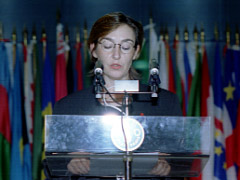


CAUCUS OF TRADE UNIONS | ||
Ms. Susan Longley, Agricultural Co-ordinator of the International Union of Food, Agricultural, Hotel, Restaurant, Catering, Tobacco and Allied Workers Associations (IUF) | ||

The international trade union movement welcomes the opportunity to address this important Summit. We speak especially on behalf of the 440 million waged agricultural and plantation workers who make up 40 percent of the global agricultural workforce and on behalf of the millions more who work in food processing and allied sectors. We believe the issue of food security cannot be addressed without also addressing the needs of these workers, who remain amongst the poorest of the poor. This is one of the greatest injustices, that those who feed the world are least able to feed themselves. For many agricultural workers, the lack of food security is linked to the continuing denial of fundamental rights set out in International Labour Conventions. Freedom of association, the right to collective bargaining, an end to forced labour, freedom from discrimination in employment and an end to child labour are integral aspects of food security. Without freedom of association, farmworkers are unable to secure the working and living conditions which would allow them to feed themselves and their families. Nor are they able to effectively assist governments in formulating food policy. In the global economy, in which national states are ceasing to play an economic role, deregulation has set the stage for a downward spiral of wages and conditions. According to a recent International Labour Office report, over the past decade real wages have declined for 40 percent of agricultural workers and for a further 18 percent they have stayed the same. Here I am talking about tea plantation workers with basic wages of less than US$1 per day. Agriculture is also one of the most dangerous industries to work in. Fatalities are high, dangerous pesticides are a constant threat to the health of workers and communities. The World Health Organization estimates that there are between two and five million cases of pesticide poisonings each year of which 40 000 are fatal. Small farmers are driven off the land, workers are made redundant as plantations are privatized at the behest of World Bank structural adjustment programmes. There is more contract labour, more seasonal work, more casualisation of the workforce, more insecurity. For us, the Rome Declaration and the Plan of Action fail to recognize the contribution of workers in agriculture and food to the goal of food security. There are only a few references to them, tagged on behind farmers, foresters and fishers, as all other people involved in the food sector. Yet there is a vast reservoir of knowledge in our membership that must be tapped if world food security is to be achieved. The British Agricultural Workers Union was one of the first to sound the alarm about BSE, Mad Cow Disease. In 1988 they called for action; their call was ignored and the disastrous consequences are now plain for all to see. No serious Action Plan can ignore the role of the transnational companies which increasingly dominate international trade in agricultural commodities - 85-90 percent of global wheat, maize, coffee, cotton and tobacco exports are marketed by a few transnational companies. The Plan of Action speaks of promoting staple foods, yet transnational corporations are encouraging the production of more and more flowers, fruit and vegetables, all for export. Action needs to be taken on four key issues in the follow-up to this Summit: the implementation of minimum labour, social and environmental standards; an effective international regulatory regime for the activities of Transnational Companies; monitoring of the social and environmental aspects of international trade and investment; and increased Official Development Assistance Support to programmes aimed at improving the earning capacity of agricultural workers and small farmers. For the international trade union movement, it is clear that fundamental human needs take precedence over economic imperatives as defined by transnational corporations and their government allies. The goal of any sane and responsible player in the world economy must be to achieve at the very minimum, global food security and sustainable development, a society where those who feed the world are able to feed themselves and to work in conditions of dignity. We call on heads of State and on governments to declare their political will to fulfil the spirit of the Rome Declaration and to implement the commitments of the Plan of Action, based on a partnership of equality and social justice. | ||
|
|
|
|

 |